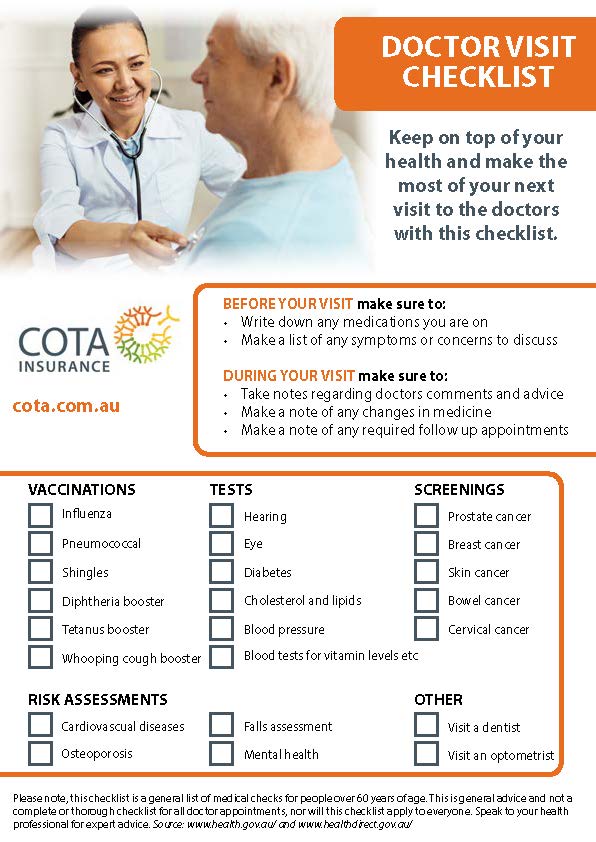Regular Health checks
Having regular health checks with your GP is a good idea, even if you are currently feeling fit and healthy. Regular health checks and screening tests can help you to stay healthy by finding any health problems in the early stages, before they develop into more serious chronic conditions and it can also help to prevent and detect serious illnesses.
If you have a family history of a certain illnesses, or other risk factors, a regular health check with screening tests is even more important.
That is why it’s a great idea to be proactive and preventative and book in for an annual check-up with your GP – It’s a great way to start a new year!
Health direct, an online government funded service that provides quality, approved health advice and information, suggest specific tests for healthy over 60 year olds. These are outlined below and is a great starting point for you when booking an annual health check with your GP.
It’s also important to remember that there are different timings and different tests for different sexes and races, so the following can vary dependant on that and other factors.
Annually
- osteoporosis risk assessment
- dental check-up
- flu vaccination (over 65)
- hearing test (over 65)
Biannually
- heart disease risk assessment
- blood pressure check
- mammogram (women)
- check for bowel cancer
- an eye test
3 yearly
- blood glucose test for diabetes
5 yearly
- cholesterol and lipids checked
- cervical screening test (women)
Other tests to have at regular intervals
- skin cancer checks
- falls assessment (over 65)
- vitamin D test
- pap smear
- bone density scan
- relevant vaccinations – see below.
Always remember that when consulting with your GP, the above is a guide, and that your GP will be able to guide you based on your own individual health and situation, which may take into account your personal health history and any family health history.
Vaccinations
There are specific vaccinations that are advised for people in their 50’s and onwards. These are as follows:
Indigenous adults 50 years and over – Pneumococcal
65 years and over – Influenza
70 years and over – Pneumococcal
70-79 years – Herpes Zoster (Shingles)
All adults – COVID-19 and booster.
The following vaccines are available on the vaccination schedule for free in the specific age groups as follows:
Shingles – 70 to 79 years
Influenza —65 years and every year there after
Pneumococcal – indigenous adults 50 year and over and non-indigenous 70 years and over
Covid-19 – all adults.
Booster vaccinations
A booster vaccination is an extra dose of a vaccine that you have had previously. It ‘boosts’ your immune system. The following vaccinations need booster doses:
- Diphtheria
- Tetanus
- Whooping cough (pertussis)
Diphtheria and tetanus vaccinations are given as diphtheria-tetanus (dT) or diphtheria, tetanus and whooping cough (pertussis) vaccinations.
Tetanus is a serious disease that causes severe muscle spasms, especially in the neck and jaw – called lockjaw. It can sometimes lead to death. A booster dose of a tetanus-containing vaccine is recommended for adults who:
- are 50 years old or over
- have not had a tetanus shot in the past 10 years
- have a wound that is not a minor cut, and your previous dose was more than 5 years ago
- have previously had a primary course of 3 doses.
Whooping cough (pertussis) is serious disease that can lead to pneumonia, brain injury and sometimes death. It can affect people at any age but is especially serious for babies. Adults who have not had the whooping cough vaccine in the past 10 years should have a single booster dose if:
- you are 65 years old or more
- you are in close contact with infants.
Talk to your doctor about whether you need a booster of dTpa (diphtheria, tetanus and whooping cough) if your last vaccination was more than 10 years ago. This booster vaccine(s) isn’t covered under the National Immunisation program for adults and seniors. Speak to your GP for more advice and information.
Click here to download a copy of our doctor visit checklist to help with your next appointment.


For more information on vaccinations, visit the national immunisation program schedule www.health.gov.au/health-topics/immunisation/immunisation-throughout-life/national-immunisation-program-schedule which supplies information for all ages and indigenous and non-indigenous Australians.
Interested in similar articles? Why not check these out:











